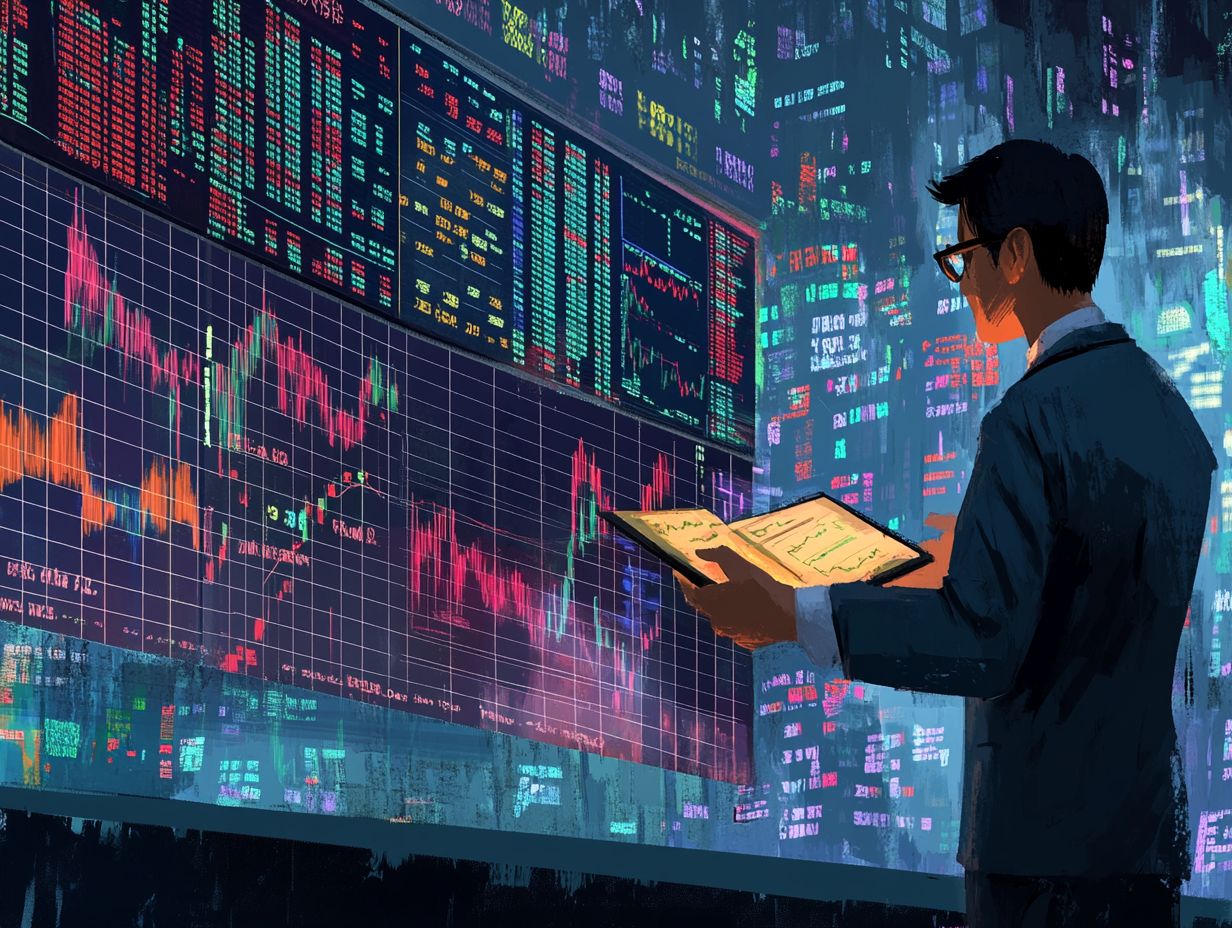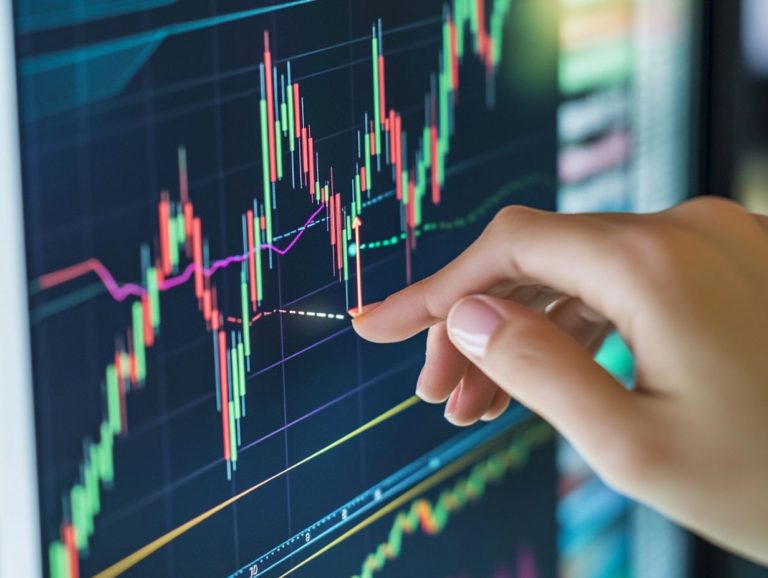Understanding the Impact of News on Stock Prices
In today s fast-paced financial landscape, understanding the interplay between news and stock prices is more critical than ever for investors. Economic reports, corporate announcements, and global events can send markets soaring or plunging in an instant, leaving a significant impact on investment decisions.
This exploration delves into how various types of news ranging from breaking headlines to detailed earnings reports can influence stock valuations. Learn essential factors like timing and market sentiment! Discover effective strategies that can help you make informed investment decisions in response to the ever-evolving news cycle.
Navigate this dynamic relationship with us, and equip yourself with the insights necessary to thrive in the stock market.
Contents
- Key Takeaways:
- The Relationship Between News and Stock Prices
- Types of News that Impact Stock Prices
- Factors that Influence the Impact of News on Stock Prices
- Strategies for Managing Stock Investments in Response to News
- Frequently Asked Questions
- What is the relationship between news and stock prices?
- How quickly can news affect stock prices?
- In what ways can news impact stock prices?
- Are all types of news equally impactful on stock prices?
- Can news affect stock prices in the long term?
- How can investors use news to make informed decisions about stock prices?
Key Takeaways:

- News can have a significant impact on stock prices, with both positive and negative effects.
- Different types of news, such as breaking news and company-specific news, can influence stock prices in different ways.
- Factors like the timeliness and relevance of news, as well as market sentiment and investor behavior, can determine the extent of its impact on stock prices.
The Relationship Between News and Stock Prices
The complex relationship between news events and stock prices has emerged as a crucial focal point for investors as analysts. Fluctuations in the stock market can frequently be traced back to identifiable news that influences investor sentiment, resulting in notable market volatility.
By grasping how daily news signals whether they pertain to political developments or economic indicators affect the performance of indices like the KSE-100, investors can gain valuable insights into the behavioral finance principles that drive market behavior.
How News Affects Stock Prices
The impact of news on stock prices is a crucial aspect of market dynamics, and understanding what is the impact of earnings on stock prices can help clarify how each announcement can lead to price adjustments that reflect investor sentiment and anticipated future performance.
Take, for example, earnings reports from major corporations; these can send ripples through the market. Surprising profits often lead to soaring stock values, while disappointing results can trigger abrupt declines. Similarly, government economic policies think interest rate changes or stimulus packages can shift perceptions, prompting investors to either buy more shares or pull back their investments.
Global events, like geopolitical tensions or natural disasters, create uncertainty and cause market fluctuations in response to potential risks.
Interestingly, while news headlines can wield considerable predictive power, it’s essential for investors to recognize that instincts may be clouded by psychological biases, such as overreaction or herd mentality. These biases can also affect decision-making in ways investors might not notice.
Types of News that Impact Stock Prices
The news that influences stock prices can be elegantly divided into two categories: positive and negative. This encompasses a range of factors, from company-specific announcements to market-wide economic indicators and geopolitical events.
Together, these elements intricately shape investor sentiment and contribute to market volatility.
Breaking News and Market Trends

Breaking news serves as a powerful catalyst for immediate market reactions, often igniting sharp movements in stock prices based on how participants interpret the implications for future trends.
When a major event unfolds be it a political upheaval or an unexpected shift in economic policy market participants might find themselves scrambling to adjust their portfolios. This flurry of activity typically manifests in increased trading volume and heightened price volatility as investors respond swiftly to the changing landscape.
As news coverage intensifies, it crafts narratives that influence not just individual stock prices but also the overall market sentiment. Traders, swayed by fear or optimism, tend to make impulsive decisions, leading to significant fluctuations. This environment can create exciting opportunities for some, while posing considerable risks for others.
Company-Specific News and Earnings Reports
Company-specific news, especially earnings reports, is crucial in shaping stock prices. As an investor, you instinctively evaluate the implications for company growth and the broader market sentiment.
When these reports surpass analysts’ expectations often dubbed positive surprises stocks can skyrocket! You and other investors rush to seize the opportunity for perceived growth potential. For example, if a tech company announces quarterly earnings that outshine expectations, you are likely to see a notable rise in its stock price, reflecting an optimistic outlook on future performance.
On the flip side, negative surprises, such as an unexpected earnings dip, can lead to sharp declines in stock value. This compels you to reassess the company s future prospects. Such market reactions can significantly impact your trading decisions, influencing not just your immediate buy or sell actions but also shaping your longer-term investment strategies.
Factors that Influence the Impact of News on Stock Prices
Several factors shape how news affects stock prices. These include the timing and relevance of the news, the prevailing market sentiment, and the psychological biases that influence investor behavior.
Timing and Relevance of News
The timing and relevance of news releases can greatly influence market fluctuations. Announcements made during peak trading hours often have a more pronounced impact on stock prices.
For instance, when critical economic indicators are released before the market opens, investors may speculate based on pre-market trading, leading to less precise price adjustments. Conversely, when news breaks during trading hours, it allows for immediate reactions, resulting in a more dynamic adjustment in stock valuations.
The relevance of the news is just as essential. Announcements related to urgent economic conditions or regulatory changes tend to carry more weight in investors’ minds. Such events can swiftly shift market sentiment, ultimately influencing trading strategies and investment decisions.
Market Sentiment and Investor Behavior

Market sentiment plays a pivotal role in shaping your investment behavior. Psychological biases can lead to irrational trading decisions that amplify price movements in reaction to news events.
Understanding how different investors respond to information is essential for grasping the nuances of market dynamics. Overreaction can occur when you or others respond too intensely to news, resulting in stock prices swinging dramatically beyond their true worth. Confirmation bias may lead you to look for information that supports what you already believe, often disregarding any conflicting data.
These psychological traps not only fuel financial speculation but also contribute to heightened volatility, creating a cycle where prices fluctuate based on sentiment rather than fundamentals. By recognizing how market sentiment intertwines with these biases, you can better navigate the turbulent waters of stock investment.
Strategies for Managing Stock Investments in Response to News
Managing your stock investments in the wake of news events demands a strategic approach. This includes employing risk management techniques and adopting long-term investment strategies that consider the ever-changing dynamics and fluctuations of the market.
Risk Management Techniques
Risk management techniques are vital for protecting your stock investments, especially during turbulent times when market fluctuations are stirred up by news events.
Consider implementing strategies like stop-loss orders a strategy to automatically sell a stock when it falls to a certain price to limit losses. They act as a safety net by effectively capping your potential losses. Additionally, diversifying your portfolio allows you to spread your capital across various sectors and asset classes, minimizing the impact of a downturn in any single investment.
These approaches provide a buffer against volatility and instill a sense of confidence, reassuring you that your financial well-being remains secure amidst unpredictable market behavior. By employing these strategies, you can cultivate a more stable investment experience, even when the market throws unexpected changes your way.
Ready to boost your investment strategy? Start by implementing these risk management techniques today!
Long-Term Investment Approaches
Long-term investment strategies help you stay focused. They allow you to navigate the short-term market dynamics that often sway with fluctuating news events. This approach enables you to capitalize on economic conditions over time.
Embracing this perspective encourages you to resist the impulse to react chaotically to market turmoil. It fosters a disciplined strategy that can yield more favorable outcomes. By remaining patient and committed to a thoroughly researched investment plan, you can harness the power of growth that builds on itself over time, amplifying your returns as the years go by.
This method smooths out the rollercoaster ride of daily market fluctuations. It helps mitigate stress and uncertainty. Investors who adopt this mindset often discover that their portfolios recover from downturns more efficiently. This ultimately enhances their returns and aligns seamlessly with their financial goals.
Frequently Asked Questions

What is the relationship between news and stock prices?
News can significantly impact stock prices. It can influence the market’s perception of a company’s performance and its potential future earnings.
How quickly can news affect stock prices?
News can have an immediate impact, with some fluctuations occurring within seconds. This is especially true for breaking news or major announcements.
In what ways can news impact stock prices?
News can influence stock prices through shifts in investor sentiment, changes in market conditions, and alterations in a company’s financial performance or outlook.
Are all types of news equally impactful on stock prices?
No, not all news has the same effect. Significant events, such as earnings reports, mergers, and regulatory changes, usually have a more substantial impact compared to smaller news items.
Can news affect stock prices in the long term?
Yes, news can have a lasting impact on stock prices, especially if it relates to fundamental changes in a company’s operations or industry trends. This can dramatically shift how investors feel about stocks!
How can investors use news to make informed decisions about stock prices?
Investors can use news to gain insights into a company’s performance, industry trends, and market conditions. This knowledge helps them make more informed decisions about buying, selling, or holding stocks.





